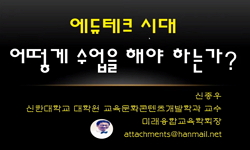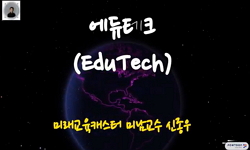This study attempted to investigate research trends in edu-tech and high-tech information communication technology-related words and derive implications on the necessity of beauty education studies. This study collected literature data published from ...
http://chineseinput.net/에서 pinyin(병음)방식으로 중국어를 변환할 수 있습니다.
변환된 중국어를 복사하여 사용하시면 됩니다.
- 中文 을 입력하시려면 zhongwen을 입력하시고 space를누르시면됩니다.
- 北京 을 입력하시려면 beijing을 입력하시고 space를 누르시면 됩니다.

에듀테크 기반 미용교육의 필요성 모색 2011-2022년 미용연구를 중심으로 = Implications on Necessity of Edu-Tech Beauty Education: Focusing on beauty studies published from 2011 to 2022
한글로보기https://www.riss.kr/link?id=A108628813
- 저자
- 발행기관
- 학술지명
- 권호사항
-
발행연도
2023
-
작성언어
Korean
- 주제어
-
등재정보
KCI등재
-
자료형태
학술저널
-
수록면
1-11(11쪽)
- 제공처
-
0
상세조회 -
0
다운로드
부가정보
다국어 초록 (Multilingual Abstract)
This study attempted to investigate research trends in edu-tech and high-tech information communication technology-related words and derive implications on the necessity of beauty education studies. This study collected literature data published from 2011 to 2022. Among them, a total of 31 papers were chosen for final analysis to set the direction of education for those in need of digital education in a changing era according to the Fourth Industrial Revolution. Starting with two theses first issued in 2011, high-tech information & communication technology-related beauty papers have been examined so far. In terms of a research topic, the beauty industry was the highest with 13 articles (41.94%), followed by makeup/hairstyling/beauty education (5 papers, 16.13%), aesthetics (2 papers, 6.45%) and nail care (1 paper, 3.22%). When compared to the beauty industry, there needed to be more studies on beauty education. In addition, there has been a demand for changes in educational environments for talent development. In terms of keyword trends, ‘augmented reality (AR)’ was the highest with 51.61%, followed by ‘virtual reality (29.03%)’, ‘3D and machine learning (6.45%)’ and ‘smart learning & metaverse (3.23%)’. In terms of a research method, ‘quantitative research’ was the highest with 13 papers (41.94%), followed by ‘literature review (8 papers, 25.8%)’, ‘other studies (5 papers, 16.13%)’, ‘mixed research (4 papers, 12.9%)’ and ‘qualitative research (1 paper, 3.23%)’. In other words, there is a necessity to perform research with multiple views. The Fourth Industrial Revolution has requested creative convergence talent across the whole process from manufacture to distribution and customer services. Under these circumstances, developing talent that meets such needs in education is also required. This study has suggested the necessity of follow-up studies in domestic beauty education with diverse research topics and through diversification of study subjects and expansion of data collection methods for in-depth approach.
참고문헌 (Reference)
1 서향희 ; 박주희, "학교현장에서 에듀테크(Edu Tech) 활용에 대한 예비교사의 인식 연구: Focus Group Interview를 중심으로" 학습자중심교과교육학회 21 (21): 253-273, 2021
2 교육부, "코로나 이후, 미래교육 전환을위한 10대 정책과제"
3 이지은, "에듀테크로 촉발되는 고등교육의 위기와 기회" 한국경영학회 24 : 151-171, 2020
4 김진옥, "에듀테크 활용에 대한 초등교사의 인식 조사" 한국실과교육연구학회 28 (28): 37-55, 2022
5 김진희 ; 정연자, "스마트러닝을 적용한 뷰티스타일링 수업사례연구" 한국인체미용예술학회 19 (19): 49-61, 2018
6 김혜균 ; 고광일, "스마트러닝 기반의 3D메이크업 시뮬레이션 실증연구" 사단법인 한국브랜드디자인학회 16 (16): 235-244, 2018
7 서울특별시교육청, "스마트기기 휴대학습 디벗 이해 자료"
8 이주연, "스마트 러닝을 위한 K-뷰티 마케팅 교과 모듈 개발: LOD기반" 국제차세대융합기술학회 6 (6): 322-329, 2022
9 이정희 ; 문지선, "미용전공자의 VR 기반 미용 교과목 인식이 전문지식과 실무능력 인식에 미치는 영향" 한국응용과학기술학회 38 (38): 1445-1454, 2021
10 최에스더, "디지털 전환 시대에 대응하는 미용 교육 패러다임 변화 -화장품·뷰티산업 동향 분석을 기반으로" 한국미용학회 28 (28): 675-688, 2022
1 서향희 ; 박주희, "학교현장에서 에듀테크(Edu Tech) 활용에 대한 예비교사의 인식 연구: Focus Group Interview를 중심으로" 학습자중심교과교육학회 21 (21): 253-273, 2021
2 교육부, "코로나 이후, 미래교육 전환을위한 10대 정책과제"
3 이지은, "에듀테크로 촉발되는 고등교육의 위기와 기회" 한국경영학회 24 : 151-171, 2020
4 김진옥, "에듀테크 활용에 대한 초등교사의 인식 조사" 한국실과교육연구학회 28 (28): 37-55, 2022
5 김진희 ; 정연자, "스마트러닝을 적용한 뷰티스타일링 수업사례연구" 한국인체미용예술학회 19 (19): 49-61, 2018
6 김혜균 ; 고광일, "스마트러닝 기반의 3D메이크업 시뮬레이션 실증연구" 사단법인 한국브랜드디자인학회 16 (16): 235-244, 2018
7 서울특별시교육청, "스마트기기 휴대학습 디벗 이해 자료"
8 이주연, "스마트 러닝을 위한 K-뷰티 마케팅 교과 모듈 개발: LOD기반" 국제차세대융합기술학회 6 (6): 322-329, 2022
9 이정희 ; 문지선, "미용전공자의 VR 기반 미용 교과목 인식이 전문지식과 실무능력 인식에 미치는 영향" 한국응용과학기술학회 38 (38): 1445-1454, 2021
10 최에스더, "디지털 전환 시대에 대응하는 미용 교육 패러다임 변화 -화장품·뷰티산업 동향 분석을 기반으로" 한국미용학회 28 (28): 675-688, 2022
11 현미희, "디지털 변화에 따른 뷰티 창업의 시사점 연구" 부산대학교 대학원 2021
12 이은지 ; 김소현 ; 이정현, "두피 관련 연구 동향 분석 - 2000년~2022년 학위논문을 중심으로" 한국인체미용예술학회 23 (23): 77-88, 2022
13 이효림 ; 김은정, "가정과교사의 에듀테크 활용에 대한 교육요구도 분석" 한국생활과학회 31 (31): 289-300, 2022
14 박기연, "가상⋅증강현실 기술과 미용교육의 융합 활성화 요인에 대한 AHP 적용연구" 건국대학교 교육대학원 2021
15 교육과학기술부, "가사실업 계열 전문교과 교육과정. 교육과학기술부 고시 제2011-361호[별책 25]"
16 하호성 ; 이재림, "K-에듀 통합플랫폼 구축을 위한 민간 에듀테크 콘텐츠의 유형에 관한 연구(미래 교수-학습 방법 및 학습유형과 연계하여)" (사)한국교육녹색환경연구원 20 (20): 11-24, 2021
17 백혜연, "4차 산업혁명시대의 뷰티산업 발전방안에 관한 연구" 한국화장품미용학회 9 (9): 455-462, 2019
18 박정수, "4차 산업혁명 및 고령화 시대의 뷰티서비스 산업의 변화추이: 스마트 뷰티케어 피부미용 시장의 확장성을 중심으로" 인문사회 21 11 (11): 205-220, 2020
19 이상원 ; 권기한, "2015 개정 미용과 교육과정에 대한 고찰" 한국인체미용예술학회 23 (23): 329-352, 2022
동일학술지(권/호) 다른 논문
-
3D 모델링을 활용한 유니버설 디자인 미용실 공간 구현 연구
- 한국인체미용예술학회
- 이가영
- 2023
- KCI등재
-
뷰티종사자의 직업전문성이 진정성과 매력성에 미치는 영향
- 한국인체미용예술학회
- 원유림
- 2023
- KCI등재
-
반영구 화장 행동특성이 재이용의도 및 추천의도에 미치는 영향
- 한국인체미용예술학회
- 김정희
- 2023
- KCI등재
-
중장년층 남녀의 성공적 노화가 헤어서비스 소비성향에 미치는 영향
- 한국인체미용예술학회
- 최지연
- 2023
- KCI등재




 KCI
KCI 스콜라
스콜라






